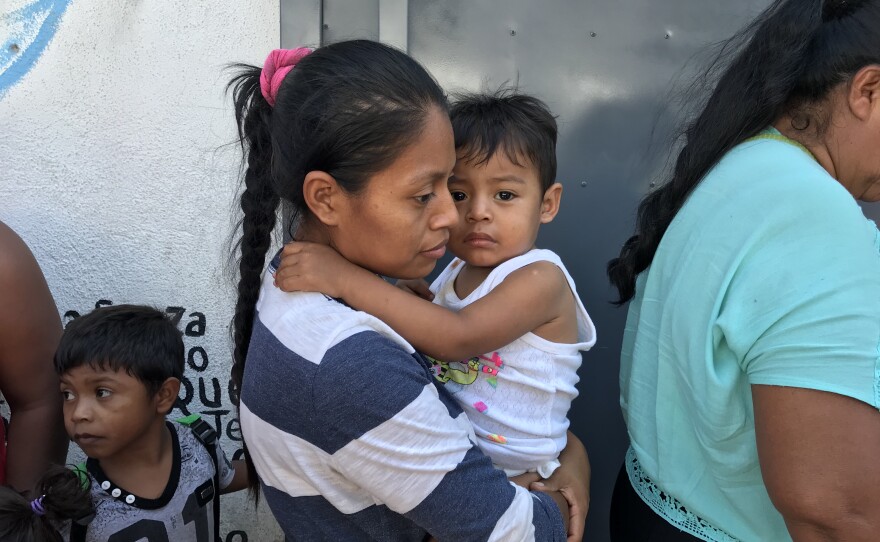UPDATE: 7:20 p.m., April 26, 2018
Three buses carrying about 150 Central Americans arrived in Tijuana on Thursday evening, the last of a "caravan" that has captured national attention.
Leo Olsen of the caravan-organizing group Pueblo Sin Fronteras said that brings the total number of caravan members who reached Tijuana to between 300 and 400.
Their numbers have dwindled over the course of the journey as some of the Central Americans, daunted by the Trump administration's voiced outrage about the caravan, decided to explore alternatives in Mexico.
Original Story
About 200 more Central Americans are expected to arrive in Tijuana on Thursday, part of a "caravan" of about 400 asylum-seeking immigrants that the Trump administration has accused of planning to enter the U.S. illegally.
The caravans are organized to bring attention to the plight of people fleeing violence in Central America, as well as to the fact that reports of officials turning people away at the border have been increasing. U.S. federal law dictates that people who present themselves at the border seeking asylum — whether it’s at a port of entry or anywhere in between — have the right to be taken into custody to see an asylum officer.
“If we were going to cross illegally, we wouldn’t be making so much noise,” said Mario Llerena, a 26-year-old member of the caravan who declined to say what country in Central America he was from, saying he fears gang retaliation. “A thief doesn’t announce when he’s coming, when he’s going to break into your house. We’ve said we’re coming. Trump knows.”
Most of the people in the caravan plan to present themselves at the San Ysidro Port of Entry on Sunday, according to Pueblo Sin Fronteras, a group that has been organizing caravans of asylum-seekers through Mexico.
One bus carrying about 50 people arrived Wednesday. They joined another group of 150 people that had arrived over the course of the previous week. Many of the asylum-seekers are staying at various migrant shelters in Tijuana.

The U.S. Department of Justice has directed U.S. attorneys to “take immediate action” to send judges and prosecutors to the border to adjudicate cases quickly.
RELATED: Remnants Of Migrant Caravan To Arrive In Tijuana This Week
Jeimy Pastora Castro, a 21-year-old Honduran woman who started her journey with the caravan in southern Mexico, said she is frightened that the U.S. is going to turn her away.
“I didn’t come here to cross illegally. I came here for help, for the President to have a heart since he’s a human like us and was also created by God,” she said as she cradled her baby outside the San Ysidro Port of Entry in Tijuana.
Pastora said she was waiting for her turn to enter the port of entry, having been given a ticket by a Mexican immigration official. The U.S. and Mexico started coordinating flows of migrants with the unofficial ticketing system during a Haitian influx a couple of years ago, to deal with strained Customs and Border Protection resources.
Like most of the other asylum-seekers, Pastora comes from Honduras, where a divisive presidential election has led to killings in the streets.
“I’ve heard they don’t give asylum anymore, that the U.S. isn’t helping anyone, that it’s a lie, that they’re going to deport me and take my daughter away,” she said.
The separation of asylum-seeking families in the custody of U.S. immigration officials has become an increasingly common practice, according to human rights groups along the border. KPBS has documented several cases of family separation. Immigration and Customs Enforcement says that in many cases, the agency separates children from their parents for their safety because smuggling organizations have a history of pairing children with non-related adults.

RELATED: Father Seeking Asylum Struggles To Reunite With Son
Trump said in a tweet Monday that he had instructed Homeland Security to turn them away.
Homeland Security said the caravan has the “apparent intention” to enter the U.S. illegally, and that the agency will not allow anyone to break the law.
Despite the Democrat inspired laws on Sanctuary Cities and the Border being so bad and one sided, I have instructed the Secretary of Homeland Security not to let these large Caravans of people into our Country. It is a disgrace. We are the only Country in the World so naive! WALL
— Donald J. Trump (@realDonaldTrump) April 23, 2018
KPBS has asked Homeland Security to clarify why it thinks the caravan plans to enter illegally but has yet to hear back.
Immigration attorney Nicole Ramos said Trump’s instruction to turn the caravan away can’t be implemented because both U.S. and international law require asylum-seekers get a fair hearing. “I think it’s just a way for him to rile up Americans who fear brown immigrants invading their borders, to create this image that a caravan of Central Americans are coming to descend upon America," Ramos said.
She and another lawyers plan to organize workshops this week to educate the Central Americans on asylum law.
Homeland Security Secretary Kirstjen Nielsen said in a statement Wednesday that anyone who makes a false immigration claim or assists someone in making a false immigration claim “will be referred for prosecution.” She added that caravan members who want asylum “should seek protections in the first safe country they enter, including Mexico.” Immigration attorneys and immigrant rights groups argue that criminal gangs in Central America can easily follow their targets into Mexico, and many don’t feel feel safe there. Despite the attention the caravan has attracted, its numbers pale in comparison to tens of thousands of mostly Central Americans came across in 2014, culminating in a standoff with protesters in Murrieta.






